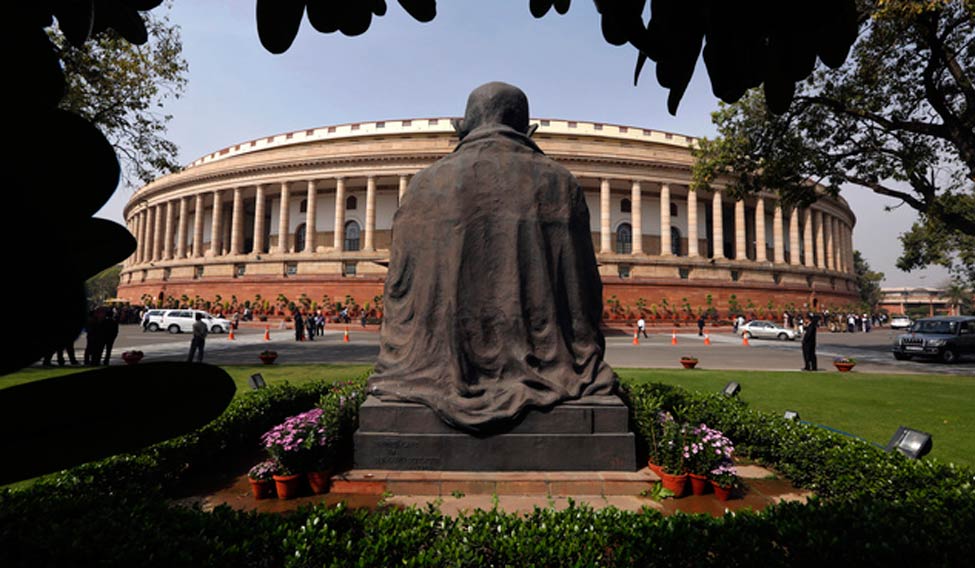With next month's crucial two-phase assembly elections in Prime Minister Narendra Modi's home state of Gujarat, the Centre is yet to firm up the dates for a curtailed winter session of Parliament.
There is no instance of this session of the country's highest legislative body being junked. The truncated winter session of Parliament is expected to be convened next month. The poll in Gujarat is scheduled on December 9 and 14. The simultaneous counting of votes of the assembly elections in Himachal Pradesh and Gujarat will be held on December 18.
The endeavour is to facilitate politicians and leaders of political parties to tour Gujarat for drumming up support amid reports that the BJP is facing a tough time because of widespread disappointment among the small and medium businesses due to hurried implementation of the GST, coupled with the widespread distress caused to the farmers.
The Congress has demanded that the winter session of Parliament be convened immediately and asked the Modi government not to weaken the country's glorious democratic tradition on the pretext of assembly elections. "...Let not the assembly election in one state or the other become an excuse for the government to run away from facing parliament. It is not about the government or the opposition, it is about the people as parliament represents the soul of democracy," emphasised Manish Tiwari of the Congress.
As the notification for the winter session of Parliament has not been issued so far, there is confusion in the polity. Parliament has by and large met for the winter session spread over a month beginning in the second half of November. The Centre's ambivalence is creating serious doubts. There has to be a 15-day gap between the notification and the start of the session. Questions are being asked if this is another instance of the BJP leadership not giving parliament the importance it deserves in convening the winter session along with side stepping the opposition.
It may be recalled that the one-day polling in Himachal Pradesh concluded on November 9. They have been compelled to wait for an extended period of about six weeks before the election results are announced. There is apprehension in the ruling party circles that the opposition is gearing up its loins to put the government on the mat in parliament connected with last November's demonetisation fiasco coupled with the poor and hurried implementation of the GST from the first of July this year.
The Centre wants to avoid any adverse fallout in poll-bound Gujarat because of the possible disruptions in the Lok Sabha and the Rajya Sabha with the ruling BJP already under considerable pressure in the state.
The Lotus party has been in power in Gandhinagar on the trot for for no less than 22 years. They are also considering having a 'Patidar' as chief minister as their win appears certain. Their margin of victory might be less than the record tally of 150 out of the 182 seats in the state assembly set by BJP President Amit Shah.
The relevance of parliament in a democratic system cannot be undermined. In the overall scheme of things the number of sittings of both the Houses of Parliament has steadily declined to 60-70 annually which has been causing concern. This despite the understanding reached that Parliament should meet at least for a 100 days every year. The Lok Sabha and Rajya Sabha have been witness to the MPs exercising their lung power in a vain bid to be heard above the din in pilloring the Centre. Major legislative matters are being approved in committees rather than the provisions being discussed and debated purposefully on the floor of the House.
For shaping of proper policies it has become necessary to have a free, frank and interruption free debates in both the Houses of Parliament. The increasing trend of political one-upmanship has been a major factor leading to disruptions and adjournments not only in Parliament but state assemblies as well.
It may be recalled Attorney General K.K. Venugopal had told the court in July that NRIs could not be allowed to vote by merely changing the rules made under the Representation of the People Act. Recently, the Centre informed the Supreme Court that a bill to amend the electoral law to allow Non-Resident Indians to vote through postal or e-ballots would be introduced in the upcoming winter session of parliament.
It is not the first time that assembly elections are being held in the country coinciding with the winter session of parliament. And it is unlikely to be the last time. It is for the BJP-led NDA government to convene the winter session of parliament so that it is not accused of deliberately giving a go-by to established parliamentary practices.





